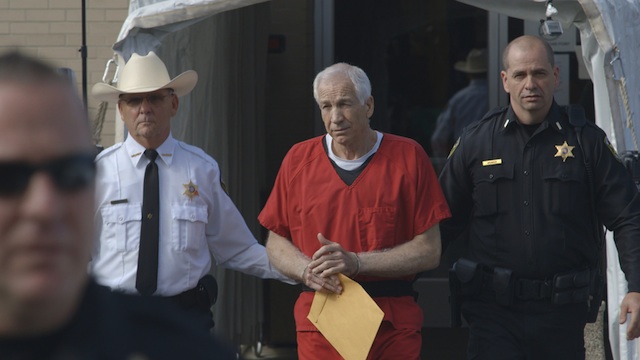‘Happy Valley’ It takes an hour of (admittedly gripping) plot summary to get there, but the Jerry Sandusky doc “Happy Valley” does ask the hard questions. They just might not be the ones you’d expect. Despite its big get Sandusky’s adopted son Matt, who wound up testifying against his legal guardian — it’s not about the man himself, who remains an enigma. But you will learn loads about the Penn State mentality. The school’s football team has gripped much of Central Pennsylvania, and in particular State College — the town defined, almost solely, by an outfit that was long an unstoppable beacon of athletic prowess, and still basically is, one unspeakable scandal aside. Filmed a year after the revelations, “Happy Valley” isn’t a you-are-there account; it’s one that tries to locate sober conclusions after the dust has settled. It’s even worthwhile revisiting a story that powered the news cycle only three years prior. Director Amir Bar-Lev has a way of exploring people who are, for one reason or another, unknowable: a little girl who may or may not paint beautiful masterpieces in “My Kid Can Paint That”; a fallen soldier misused as a propaganda tool in “The Tillman Story.” He doesn’t feel the need to pile much more demonization upon Sandusky — someone who truly, disturbingly seems to believe he did no wrong. One piece of chilling, harrowing stolen footage finds him on his back porch, barely able to hold it together, a prisoner of his home and his own belatedly damning demons. Bar-Lev doesn’t even take a hard line on Penn State coach Joe Paterno. The media was quick to turn the storied figurehead into a kind of accomplice — someone who knew what his assistant coach had done but who did only the bare amount to stop him. Paterno became the fall guy, his reputation destroyed, his statue removed. This was not unearned, and yet Bar-Lev seems uncomfortable with the extent of his punishment, or at least that he became a victim of an angry mob that demanded blood. At the very least it resulted in institutional sloppiness; Penn State was fined $60 million and lost some of its athletic bona fides, but the only ones hurt are innocent students. It’s a palliative that makes people fell better and fixes nothing. Not that the pro-Paterno side is any better. Perhaps the key scene is set at the coach’s about-to-be-removed statue, where one stubborn protestor, wielding a comically tiny paper sign against Paterno, knocks heads with visitors. They insist he’s infringing on their rights, while offering up a weak defense on Paterno: He did report Sandusky, once — a position held up by a mere technicality. Continued Penn State fanatics tend to argue moving completely on; one rabid fan student, from his Nittany Lion-bedecked dorm room, launches into a testy, ill-advised rant about hating having to always preface his Penn State love with a nod to the victims. He has a point, sort of, albeit not very well articulated: that the “shame spectacle,” as one professor puts it, is largely self-serving and does little to address real problems. Not that it matters: By the end it’s back to business as usual, because football can never die.
Director: Amir Bar-Lev
Genre: Documentary
Rating: NR
3 (out of 5) Globes
Review: ‘Happy Valley’ takes a chilling look at Penn State

A&E IndieFilms
Follow Matt Prigge on Twitter @mattprigge


















